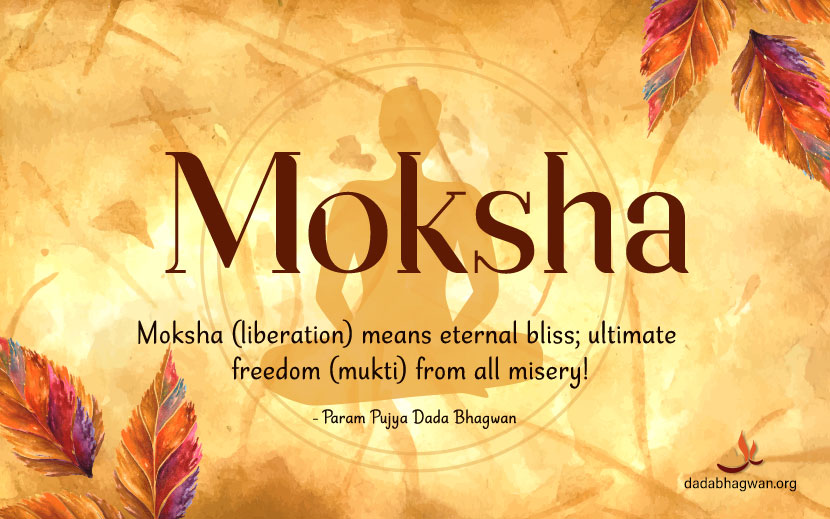What is the meaning of Moksha / Salvation / Liberation? Why does one search for Moksha?
The meaning of Moksha / Salvation / Liberation has different interpretations for different people. However, in the spiritual realm, it ultimately boils down to just one meaning.

“Moksha (liberation) means eternal bliss; ultimate freedom (mukti) from all misery!”
- Param Pujya Dada Bhagwan
Every being is in search of happiness. Everything we do is with the intent to be happy. It is the intrinsic nature of every being to look for happiness. As a child, one searches for happiness in toys, games and in being loved and pampered. As an adult, the source of happiness changes, but the search for happiness continues. One finds happiness in money, possessions, relationships, status, etc. However, unfortunately, in none of these, does one find permanent happiness. All the possessions, relationships, etc. leave us, or we leave them, some day or the other. When they go away from us, they give us misery that is proportional to the happiness we derived from them. Thus, the world runs in search of permanent happiness but ends up in finding temporary happiness that results in misery. The meaning of Moksha is nothing but permanent happiness.
Let us have a look on the conversation with Param Pujya Dada Bhagwan, on permanent happiness.
Questioner: I am looking for the Self.
Dadashri: Only a rare person can find the Self. Not all living beings look for the Self. What are they all looking for? They are all looking for happiness; no living being likes unhappiness. Whether it is the tiniest of insects or a man; no one likes unhappiness. Now they all do have happiness but they are not content. What is the reason for that? The happiness they have is not real happiness. True happiness is that which once you experience it, there will never be any more unhappiness. Everyone is looking for that kind of happiness. The experience of this happiness in human birth is called Moksha (freedom from all forms of suffering – first stage of Moksha). Then (the ultimate) Moksha occurs when all one’s karmas come to an end. But the first stage of Moksha should occur here (in this life). Kashay (anger, pride, deceit and greed) should not occur. Do you experience any kashay?
Questioner: Yes, I do.
Dadashri: Do you like kashay?
Questioner: I do not like them but they do occur.
Dadashri: Kashay verily is pain and unhappiness (dukh). The whole world is in kashay. They do not like kashays but they are entrapped by them. Everyone is under the control of kashays, so what can the poor people do? They want so much not to get angry and yet inevitably they get angry. What kind of happiness do you want, temporary or permanent?
Questioner: Everyone wants permanent happiness.
Dadashri: And yet people do not get permanent happiness. What is the reason for this?
Questioner: Such are our karmas, what else could it be?
Dadashri: Whatever the karmas may be, you have not found anyone who can show you or give you permanent happiness. If you ask the one who is experiencing such happiness to show you how you too can attain it, then your work will be done. But you have not found anyone like that. Only the Gnani Purush is in permanent happiness; permanent bliss. He remains in Moksha. Your problem will get solved when you go to Him otherwise you will have to keep on wandering from one life to another. How can happiness ever remain in this era of the time cycle? How can it remain without knowledge of the Self? Ignorance of the Self is itself pain.
Questioner: Does every human being have the right to attain Moksha?
Dadashri: Every embodied Self has a right to Moksha. This is because every embodied Self is looking for happiness in one place or another and in doing so, has wandered for countless lifetimes. One is looking for eternal happiness, which is Moksha.
subscribe your email for our latest news and events





